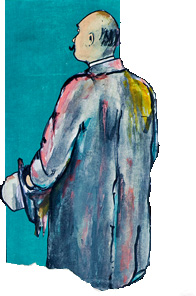Science Seen Physicist and Time One author Colin Gillespie helps you understand your world.
Why the Eye?
I bite the bullet and start pounding out the story of the way the universe began. As I write, the story keeps on growing — guess I should have known. But I’m enthusiastic as I try to make it easy for the reader to understand.
Doug’s a friend who reads some early drafting. He tries to break it gently: Some parts, such as those with humor, are quite good, he says. Though no expert, he can understand them. Other parts, he thinks, could lighten up.
He has an idea: Could it become a detective story? (He’s been watching old Columbo movies.) I’m intrigued; it’s worth a try
A detective story will need dialogue. Suits me fine. And lots of writers have used dialogue to lighten up some heavy stuff. Two hundred and some years ago famous philosopher David Hume said:
There are some subjects … to which dialogue-writing is peculiarly adapted, and where it is still preferable to the direct and simple method of composition.
Detective stories need a narrator, an observer who should not do the detecting. Soon he’s doing all the writing, in a style that’s his not mine. A retired LAPD inspector . . . but let’s not give his tale away. Suffice to say, I find that my narrator teams up with a dubious―in all three senses of that word; he’s doubtful and ambiguous and suspect―detective.
This will lead to consequences that I can’t foresee.
Detectives don’t solve problems, they solve cases. And to solve them they need clues. I know it’s never clear what is a clue and what is a red herring. But clues are inconsistencies, things that don’t make sense or don’t fit in. And as I google around physics-world I find it’s littered with them. It’s a fact that’s well known to the cognoscenti; I find quotes from those who say that modern physics is awash in inconsistencies. Some years ago a leading physicist I come to view as a bellwether, Carlo Rovelli, says:
The “fundamental scientific view of the world” of the present time is characterized by an astonishing amount of perplexity, and disagreement, about what time, space, matter and causality are.
Twelve years later he’s still saying physics is ‘in a peculiar phase of deep conceptual confusion.’
Those perplexities and disagreements look like super clues. (Thanks, Doug!)
But to get my head around the clues I should go back to school. Or should I? After all, this is the narrator’s problem. What, I wonder, will he do?
Sources:
David Hume (1779), Dialogues Concerning Natural Religion, Edinburgh: [publisher unknown], p. 1; http://www.gutenberg.org/files/4583/4583-h/4583-h.htm
Carlo Rovelli (1997) “Halfway Through the Woods” in The Cosmos of Science: Essays of Exploration, John Earman and John B. Norton (eds.), Pittsburgh: University of Pittsburgh Press, p. 180; http://philpapers.org/rec/ROVHTT
Carlo Rovelli (2009), “Unfinished Revolution”, in Approaches to Quantum Gravity: Toward a New Understanding of Space, Time and Matter, Daniele Oriti (ed.), New York: Cambridge University Press, p. 4; http://arxiv.org/pdf/gr-qc/0604045.pdf


Before reading and going deeper further……..where does GOD fit into all this. I believe that GOD formed science so why would he not use it today……….what is your view on how or where does/did GOD begin?
Thank you kindly in advance.
Trish
Big questions! My view (or my narrator’s) will be out there soon. Meanwhile my blog looks at physics in the world we have, illuminated by the way that it began.
The subject matter of my recent book, Time One, is natural philosophy. It asks: How? As you imply (and the book’s narrator says explicitly) the answer has deep implications for religious philosophy. These are the purview of the next volume, now in progress. It will ask: Why?
Here is a clue to where I see this going (taken from Time One, the chapter on “The Role of Religion”):
“Beginning by its very nature tends to raise anew pulp fiction’s clichéd question: Who? As in: Whodunit? This question is of course not scientific. It’s religious. It needs different clues, a different cast, a different detective and a different book. But the Beginning might invite―nay, may require―a new look at what I have called the Old Divide, ’twixt science and religion. Is it such a gulf?”
Thanks for the big questions. They call for well-thought-out answers.
Great stories